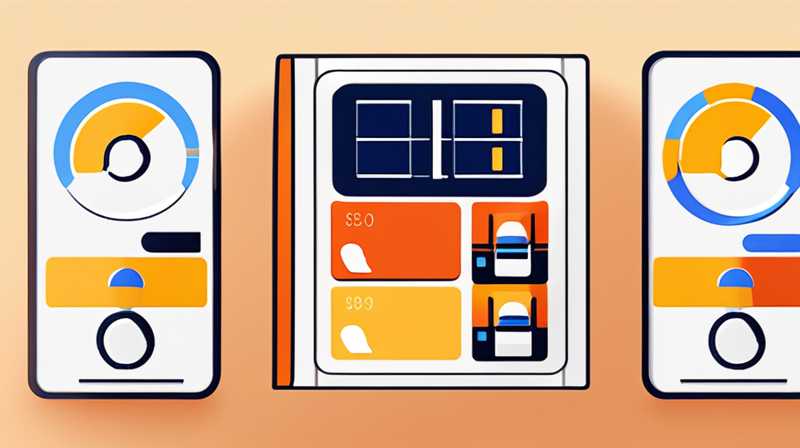
To select the appropriate solar meter brand, several factors should be considered. 1. Quality and Reliability, opting for established brands known for durability and accuracy can ensure long-term productivity. 2. Features and Functionality, advanced features such as real-time data monitoring and compatibility with smart devices enhance usability. 3. Warranty and Customer Support, choosing a brand that offers an extensive warranty and responsive customer assistance can be crucial in addressing potential issues. 4. Price and Budget, it’s essential to balance cost with quality to ensure that you receive good value for your investment. 5. User Reviews and Recommendations, researching user feedback can provide insights into the practical performance of different brands. Focusing on these key points will aid in making an informed decision that aligns with individual needs and preferences.
1. QUALITY AND RELIABILITY
When choosing a solar meter, the first consideration ought to be quality and reliability. A solar meter is an intricate device that measures energy production from solar panels, and if it fails to operate accurately or consistently, users may be left in the dark regarding their energy needs and savings.
Reputable manufacturers often invest in R&D to enhance their products continually. This results in a more robust build that can withstand factors such as temperature variations and moisture. Established brands often come equipped with higher-grade materials and components designed for longevity. This durability translates to fewer replacements and repairs over time, ultimately yielding a more favorable return on investment for homeowners or businesses engaged in solar energy.
Furthermore, solar meters from esteemed brands frequently undergo rigorous testing before hitting the market. These tests ensure that the devices meet specific industry standards, providing users with confidence in their selections. When weighing options, one should look for products that possess necessary certifications, such as those from Underwriters Laboratories (UL) or the International Electrotechnical Commission (IEC). These symbols of credibility signify that the manufacturing processes adhere to established safety and performance benchmarks.
2. FEATURES AND FUNCTIONALITY
The next aspect to contemplate involves features and functionality. Not all solar meters are created equal, and distinguishing what features are essential or beneficial based on specific needs can simplify the decision-making process. Technological advancements mean that solar meters are now more functional than ever, incorporating features that enhance user experience and streamline energy management.
One prominent feature to consider is data monitoring capabilities. Many modern solar meters offer real-time data access, allowing users to track energy production effortlessly. This can be particularly advantageous for homeowners who wish to monitor their solar energy usage and savings actively. Having access to this information enables users to understand their energy consumption patterns better and identify any possible inefficiencies.
Moreover, compatibility with smart home systems represents another significant feature available in many solar meters. Devices that integrate with apps or voice control systems enhance ease of use, making it more convenient for users to access and analyze their energy data. This level of integration may contribute to a more interactive experience, as users can adjust settings or receive notifications at their convenience.
3. WARRANTY AND CUSTOMER SUPPORT
Warranty and customer support are crucial elements in the decision process when selecting a brand of solar meter. A favorable warranty often reflects a manufacturer’s confidence in their product and commitment to customer satisfaction. A warranty that covers defects in materials and workmanship can provide peace of mind that any manufacturing flaws will be addressed without additional costs.
In addition to warranty considerations, effective customer support needs to be evaluated when engaging a brand. A manufacturer that offers responsive and knowledgeable service is invaluable in the solar energy sector. Whether dealing with installation concerns, warranty claims, or simple questions regarding functionality, access to reliable help can alleviate potential stress and frustration.
Customer service experiences, such as response times and support quality, should be thoroughly researched. Online reviews, testimonials, and even social media interactions can reveal insights into how efficiently a company handles customer needs. A robust support system indicates that the brand stands behind its products, fostering a sense of trust between the consumer and the manufacturer.
4. PRICE AND BUDGET
An often-determining aspect of any purchasing decision is the price and budget associated with acquiring a solar meter. Cost varies significantly across brands and models, making it necessary to set a budget that aligns with one’s financial capabilities.
While it may be tempting to choose the most economical option available, it is essential to remember that price often correlates with quality. Inexpensive meters may lack durability or accuracy, leading to further expenses in repairs or replacements. Balancing, affordability with performance should guide one’s selections.
Moreover, exploring various payment options like financing or leasing can expand the range of available solar meters. Some manufacturers may also offer promotional deals or discounts on their products, further enhancing the appeal of specific brands. Overall, effective budgeting requires a clear understanding of one’s requirements and available options in the solar meter market.
5. USER REVIEWS AND RECOMMENDATIONS
User reviews and recommendations form an essential cornerstone in the evaluation process of solar meter brands. Personal experiences shared by individuals already utilizing these devices can shine a light on practical performance aspects that manufacturers might overlook in their marketing efforts.
Various online platforms host consumer feedback on diverse solar meters, allowing potential buyers to explore collective opinions on specific features and overall satisfaction. By assessing both positive and negative reviews, one can gain a comprehensive understanding of how well a device meets its intended purposes. Additionally, communing with family, friends, or local community members who have experience with particular brands may yield trustworthy insights that further inform the decision.
Engaging with solar energy forums or groups can also prove beneficial. These platforms often consist of experts and seasoned users who can provide recommendations based on empirical data and professional experiences. Such discussions facilitate collaborative knowledge sharing, promoting informed choices based on community-driven input.
FAQs
WHAT ARE THE MAIN FEATURES TO LOOK FOR IN A SOLAR METER?
When considering a solar meter, key features include accuracy, data monitoring capabilities, integration with smart home systems, and built-in communication technology. Accuracy ensures that the measurements of energy production are precise, ultimately giving users clear insights into their energy usage and savings. Moreover, data monitoring technology is valuable for tracking energy generation patterns, allowing users to optimize energy consumption effectively. Integration options enhance convenience, enabling users to access and manipulate data through mobile apps or connected devices. Additional factors include built-in connectivity, such as Wi-Fi or Bluetooth, which can simplify data retrieval and remote monitoring, contributing to a user-friendly experience.
HOW DOES A SOLAR METER WORK?
Solar meters operate by measuring the amount of electricity generated by a solar panel system. The device utilizes a set of sensors that gauge the direct current (DC) produced by the solar panels. This DC is then converted into alternating current (AC) using inverters, making it compatible with home electrical systems. The meter continuously tracks energy generation, displaying vital information such as total output and efficiency levels. Some advanced meters also feature data communication capabilities, allowing users to access their energy data in real-time through dedicated mobile apps. The overall functionality enables homeowners and businesses to assess energy usage effectively and make informed decisions.
WHAT IS THE AVERAGE LIFESPAN OF A SOLAR METER?
The average lifespan of a solar meter generally ranges between ten to twenty years, depending largely on its build quality and the environments in which it operates. High-quality meters designed by reputable manufacturers may exhibit greater longevity due to superior materials and engineering. External factors such as extreme weather conditions, humidity, and exposure to sunlight can influence their operational duration. Proper installation and maintenance are also integral to extending a solar meter’s lifespan. Regular checks and timely servicing can significantly reduce the likelihood of equipment failure, ensuring optimal performance throughout the meter’s service life.
The selection of an appropriate solar meter brand is a multifaceted challenge. It involves evaluating various elements, such as quality and reliability, ensuring that the device can withstand environmental factors while maintaining accuracy. One must also consider the features and functionalities that meet their unique needs, such as data monitoring capabilities and smart home integration. Furthermore, warranty offerings and customer service play significant roles, as they provide reassurance and support when issues arise. Budgetary constraints must be factored in, balancing cost against quality to achieve an optimal result. User reviews and recommendations can illuminate practical experiences that further refine the decision-making process. By thoroughly exploring these considerations, individuals can make an informed choice that suits their specific requirements and enhances their solar energy experience. In the long run, the right solar meter can drive efficiency, promote sustainability, and empower users to harness the full potential of their solar investments.
Original article by NenPower, If reposted, please credit the source: https://nenpower.com/blog/which-brand-of-solar-meter-should-i-choose/











